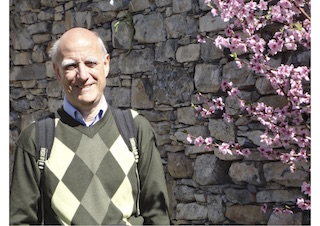Studying at the University of Verona
Here you can find information on the organisational aspects of the Programme, lecture timetables, learning activities and useful contact details for your time at the University, from enrolment to graduation.
Academic calendar
The academic calendar shows the deadlines and scheduled events that are relevant to students, teaching and technical-administrative staff of the University. Public holidays and University closures are also indicated. The academic year normally begins on 1 October each year and ends on 30 September of the following year.
Course calendar
The Academic Calendar sets out the degree programme lecture and exam timetables, as well as the relevant university closure dates..
| Period | From | To |
|---|---|---|
| Primo semestre | Sep 29, 2008 | Jan 17, 2009 |
| Secondo semestre | Feb 23, 2009 | May 30, 2009 |
| Session | From | To |
|---|---|---|
| Sessione d'esame invernale | Jan 19, 2009 | Feb 21, 2009 |
| Sessione d'esame estiva | Jun 3, 2009 | Jul 31, 2009 |
| Sessione d'esame autunnale | Sep 1, 2009 | Sep 26, 2009 |
| Session | From | To |
|---|---|---|
| Sessione di laurea invernale | Mar 10, 2009 | Mar 11, 2009 |
| Sessione di laurea estiva - I appello | Jun 16, 2009 | Jun 17, 2009 |
| Sessione di laurea estiva - II appello | Jul 14, 2009 | Jul 15, 2009 |
| Sessione di laurea autunnale- I appello | Oct 20, 2009 | Oct 21, 2009 |
| Sessione di laurea autunnale- II appello | Dec 1, 2009 | Dec 2, 2009 |
| Period | From | To |
|---|---|---|
| Festa di Ognissanti | Nov 1, 2008 | Nov 1, 2008 |
| Festa dell'Immacolata Concezione | Dec 8, 2008 | Dec 8, 2008 |
| Vacanze di Natale | Dec 22, 2008 | Jan 6, 2009 |
| Vacanze di Pasqua | Apr 10, 2009 | Apr 14, 2009 |
| Festa della Liberazione | Apr 25, 2009 | Apr 25, 2009 |
| Festa del Lavoro | May 1, 2009 | May 1, 2009 |
| Festa del Santo Patrono | May 21, 2009 | May 21, 2009 |
| Festa della Repubblica | Jun 2, 2009 | Jun 2, 2009 |
| Vacanze estive | Aug 8, 2009 | Aug 16, 2009 |
| Description | Period | From | To |
|---|---|---|---|
| Primo semestre | Primo semestre | Sep 29, 2008 | Jan 17, 2009 |
| Secondo semestre | Secondo semestre | Feb 23, 2009 | May 30, 2009 |
Exam calendar
Exam dates and rounds are managed by the relevant Culture and Civilisation Teaching and Student Services Unit.
To view all the exam sessions available, please use the Exam dashboard on ESSE3.
If you forgot your login details or have problems logging in, please contact the relevant IT HelpDesk, or check the login details recovery web page.
Should you have any doubts or questions, please check the Enrollment FAQs
Academic staff
 bernard.aikema@univr.it (per tutti), aikemaforstudents@gmail.com (per studenti)
bernard.aikema@univr.it (per tutti), aikemaforstudents@gmail.com (per studenti)
 +39 045802 8197
+39 045802 8197

Avezzu' Guido
 guido.avezzu@univr.it
guido.avezzu@univr.it

Bassetti Massimiliano
 massimiliano.bassetti@univr.it
massimiliano.bassetti@univr.it
 045802 8376
045802 8376
Brusegan Rosanna
 rosanna.brusegan@univr.it
rosanna.brusegan@univr.it
 +39 045802 8115
+39 045802 8115
 andrea.castagnetti@univr.it
andrea.castagnetti@univr.it
 alberto.cavarzere@univr.it
alberto.cavarzere@univr.it
 giorgio.graffi@univr.it
giorgio.graffi@univr.it
Leso Erasmo
 erasmo.leso@univr.it
erasmo.leso@univr.it
 +39 045802 8559
+39 045802 8559
Lonardi Gilberto
 gilberto.lonardi@univr.it
gilberto.lonardi@univr.it
 +39 045802 8378
+39 045802 8378
 giuseppe.longo@univr.it
giuseppe.longo@univr.it

Mastrocinque Attilio
 attilio.mastrocinque@univr.it
attilio.mastrocinque@univr.it
 +39 045802 8386
+39 045802 8386

Pasini Roberto
 pasini.roberto@univr.it
pasini.roberto@univr.it
 +39 045802 8121
+39 045802 8121
Prugni Gianmario
 gianmario.prugni@univr.it
gianmario.prugni@univr.it
 +39 045802 8116
+39 045802 8116
Reggiani Renato
 gianmaria.varanini@univr.it
gianmaria.varanini@univr.it
Study Plan
The Study Plan includes all modules, teaching and learning activities that each student will need to undertake during their time at the University.
Please select your Study Plan based on your enrollment year.
1° Year
| Modules | Credits | TAF | SSD |
|---|
2° Year activated in the A.Y. 2009/2010
| Modules | Credits | TAF | SSD |
|---|
| Modules | Credits | TAF | SSD |
|---|
| Modules | Credits | TAF | SSD |
|---|
Legend | Type of training activity (TTA)
TAF (Type of Educational Activity) All courses and activities are classified into different types of educational activities, indicated by a letter.
Literature learnings (m) (2008/2009)
Teaching code
4S02282
Credits
6
Coordinator
Language
Italian
Location
VERONA
Also offered in courses:
- The Didactics of the Italian Language (p) of the course Specialized Degree in Philology and Modern and Contemporary Literature
The teaching is organized as follows:
Learning outcomes
Module: Letterature antiche (m) I modulo
-------
The course aims to tackle the unavoidable problem of attitude towards the classics. What research paradigm in Greek and Latin contemporary man? What are the new ways of approach to ancient texts? We can dall'eredità this classic? The progress of oblivion, passing and awareness: as a resource for modernity daWesperienza old? The educational value of dassici and stereotypes to quell the conscience. Beyond rejection, beyond the erudition: the need for a conscious selection.
Module: Didattica della letteratura italiana (m) II modulo
-------
the aim of this course is to provide students with the essential skills and competences connected with Italian literature teaching from a methodological and epistemological point of view. In this sense an objective will be taken into particular consideration: to enable students to approach literary texts by using updated teaching techniques, tools and instructional strategies. The course will also initiate students to create models of knowledge based on the demands of teaching activities. These models will be directed to point out the educational significance of research on literature, by emphasizing the interaction between the knowledge of the discipline and psychological and pedagogical competences.
Program
Module: Letterature antiche (m) I modulo
-------
Module: Didattica della letteratura italiana (m) II modulo
-------
Prerequisites: general knowledge of literary history and of the basic texts of Italian literature.
Course content: this course is designed to acquaint students with various materials, teaching methods and theories appropriate for teaching literature in middle schools and high schools, including the multiple ways students and teachers interact with the text within the context of various classroom settings. The contents will be the following: objectives and purposes of literary education. Literature and literariness. Factors that make up literary communication and their connection with the analysis of literary texts. Strategic and tactical methods to approach a text. Literature and psychology: motivational and metacognitive aspects. Literature and the anthropological approach: from the different elements of a text (based on its author, readers, language, context, means of transmission) to its well-founded fruition in the classroom and in other places (e.g. libraries and museums) suitable to favour literature learning and appreciation. Strategies that promote and guide students' independent reading.
Teaching methods: lectures and talks with interaction with students.
Examination Methods
Module: Letterature antiche (m) I modulo
-------
Module: Didattica della letteratura italiana (m) II modulo
-------
the student’s preparation will be assessed by an oral exam, to evaluate his/her understanding and help him/her develop both as a student and a teacher candidate of literature.
Type D and Type F activities
Modules not yet included
Career prospects
Module/Programme news
News for students
There you will find information, resources and services useful during your time at the University (Student’s exam record, your study plan on ESSE3, Distance Learning courses, university email account, office forms, administrative procedures, etc.). You can log into MyUnivr with your GIA login details: only in this way will you be able to receive notification of all the notices from your teachers and your secretariat via email and soon also via the Univr app.
Graduation
List of theses and work experience proposals
| theses proposals | Research area |
|---|---|
| tesi di Glottologia, Storia comparata, Linguistica storica | ENGLISH LANGUAGE - Grammar and Syntax – Grammatik und Syntax |
| tesi di Glottologia, Storia comparata, Linguistica storica | GERMANIC LANGUAGE - Dialectology - Dialektologie |
| tesi di Glottologia, Storia comparata, Linguistica storica | HUMANITIES & SOCIAL STUDIES - HUMANITIES & SOCIAL STUDIES |
| tesi di Glottologia, Storia comparata, Linguistica storica | Indo-European languages & literatures - Indo-European languages & literatures |
| tesi di Glottologia, Storia comparata, Linguistica storica | LINGUISTICS - LINGUISTICS |
Gestione carriere
Linguistic training CLA
Double Degree
The University of Verona, through a network of agreements with foreign universities, offers international courses that enable students to gain a Double/Joint degree at the time of graduation. Indeed, students enrolled in a Double/Joint degree programme will be able to obtain both the degree of the University of Verona and the degree issued by the Partner University abroad - where they are expected to attend part of the programme -, in the time it normally takes to gain a common Master’s degree. The institutions concerned shall ensure that both degrees are recognised in the two countries.
Places on these programmes are limited, and admissions and any applicable grants are subject to applicants being selected in a specific Call for applications.
The latest Call for applications for Double/Joint Degrees at the University of Verona is available now!
Student mentoring
Requisiti classi di abilitazione insegnamento
Requisiti necessari per accedere alle classi di abilitazione per l'insegnamento.
vedi allegato pdf
Inoltre, per informazioni sui 24 CFU nelle discipline antropo-psico-pedagogiche e nelle metodologie e tecnologie didattiche, si veda -> LINK
Documents
| Title | Info File |
|---|---|
|
|
pdf, it, 307 KB, 30/11/21 |














